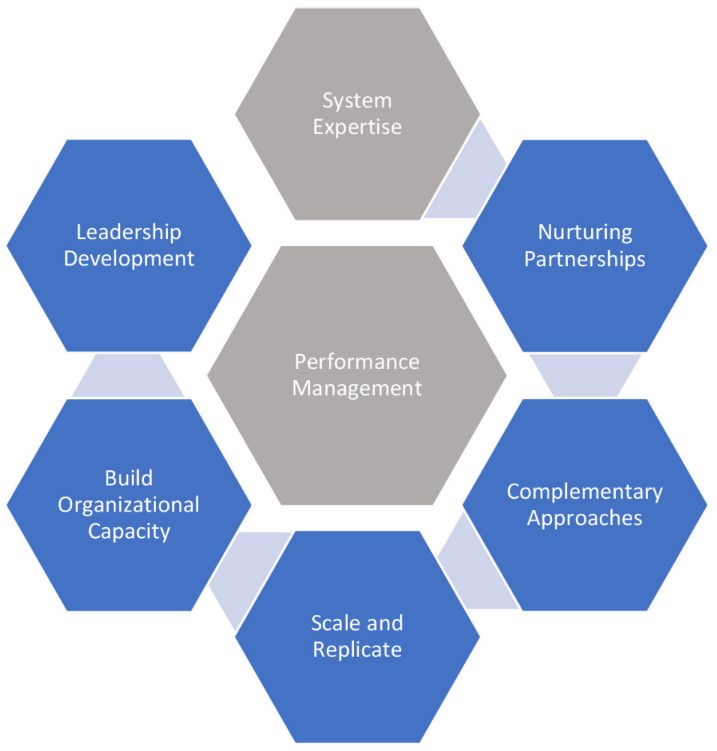Finding and Nurturing Effective Partnerships: The New Jersey Health Care Quality Institute
For 20 years, The Nicholson Foundation worked to advance meaningful change in safety net service systems in New Jersey. Its grantmaking journey is described in Changing Systems, Changing Lives: Reflecting on 20 Years.
Through stories and related text, the book showed how a small family foundation could take six guiding themes and put them into action through grants and partner support. In the process, the Foundation spurred real systems change that benefitted individuals, families, and communities.
A recent scholarly paper built on that work, helping to make the Foundation’s approach broadly accessible to researchers, academics, and philanthropists. “A Framework for Creating Systems Change,” by Drs. William Brown and Wynn Rosser and published in The Foundation Review, presents a new model for systems change. Five of the model’s seven components reflect themes in Changing Systems, Changing Lives. The sixth component slightly shifts the emphasis of the Foundation’s “Engaging with Government” theme, and the seventh highlights the Foundation’s overall approach by including performance measurement as a distinct and separate component of the model.

A Long-Term Partnership for Systems Change
Brown and Rosser note that collective action is foundational to initiatives that result in effective system impacts and that “collaboration and relationships are central components of systems change.” Describing the “Nurturing Partnerships” component of their model, they also highlight the importance of infrastructure systems to support partnership activities.
Here’s how the Foundation’s work exemplified this aspect of Brown and Rosser’s systems change model: During its early years, the Foundation focused on social services, such as education. Over time, however, staff realized that the Foundation couldn’t make progress in these areas without equal attention to healthcare, because health was intertwined with so many other factors, such as poverty, homelessness, and educational barriers, that affected the well-being of vulnerable populations.
The more we learned about healthcare issues in New Jersey, the more we recognized we needed a like-minded partner to help us think strategically about our grantmaking in this area. We found that partner in the New Jersey Health Care Quality Institute. Founded in 1997, the Quality Institute is a nonprofit policy and analysis organization focused on improving the safety, quality, and affordability of healthcare.
For more than 10 years, the Foundation and the Quality Institute worked closely together, forging a strong partnership to promote a more effective Medicaid program in New Jersey. One of the most significant projects—jointly planned and carried out—was the development of Medicaid 2.0: Blueprint for the Future.
Begun in March 2016, this initiative aimed to create a blueprint that New Jersey could use to redesign and modernize its Medicaid program. Such a plan had the potential to improve the lives and health of hundreds of thousands of people enrolled in the program.
The initiative involved several phases:
- Learning sessions with the many groups and agencies in New Jersey that designed, delivered, and paid for Medicaid services;
- An assessment of Medicaid programs and innovations in other states; and
- A report development phase focused on five key focus areas
— Modernization
— Basic Medicaid Reforms
— Upgrades to the Medicaid Model
— Financing Reform
— Path to Population Health
Medicaid 2.0: Blueprint for the Future was released in March 2017, with 24 main recommendations. The report was widely praised and accepted, in large part due to the deep involvement of so many government agencies, non-governmental organizations, and individuals throughout the process.
Following the report’s release, and with additional Foundation funding, the Quality Institute collaborated with state healthcare leaders to determine how the recommendations could be carried out. As of February 2021, when the Foundation closed, more than half had been implemented or were in the process of being implemented.
And, as Brown and Rosser noted, investing in infrastructure systems is critical to supporting partnership activities. The Foundation’s substantial and consistent funding support allowed the Quality Institute to grow into a strong and self-sustaining organization with the capacity for deep and independent thinking about people, communities, and systems and how state programs could be strengthened to improve health outcomes.
Learn More
- Read the other blogs in this A Framework into Action series:
— Elevating Best Practices and Building Evidence: Scaling and Replicating
— Finding and Nurturing Effective Partnerships: Supporting Healthy Children
— Organizational Capacity
— Complementary Approaches
— Leadership Development - Visit the New Jersey Health Care Quality Institute’s website.
- Read Medicaid 2.0: Blueprint for the Future.
- Read Brown W, Rosser W. A Framework for Creating Systems Change. The Foundation Review,
2023;15(4):50-6. https://doi.org/10.9707/1944-5660.1678 - Order a free copy of Changing Systems, Changing Lives: Reflecting on 20 Years. This book describes the 20-year journey of The Nicholson Foundation.

